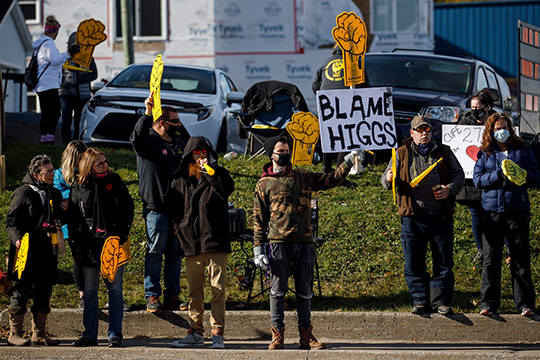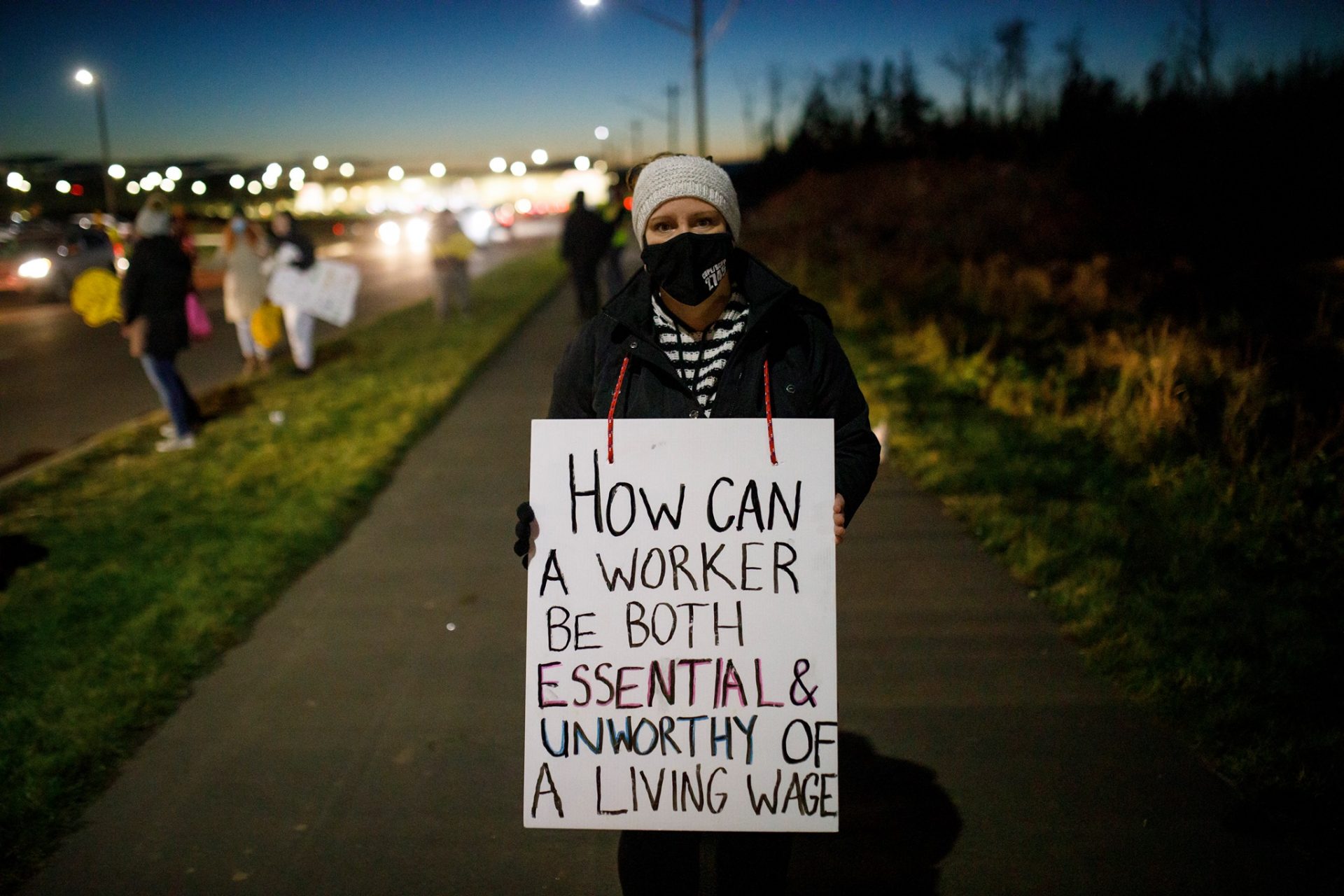
On Friday, Nov. 5, the government of New Brunswick used the COVID-19 state of emergency to force striking health-care workers back to work. While Attorney General Hugh Flemming claims that “This action has nothing to do with labour relations,” it is clear that the government is using the COVID state of emergency to attack the right to strike and weaken the unions in the ongoing public sector dispute.
The need to defy back-to-work orders
The use of this back-to-work order comes at the height of a bitter labour struggle between 22,000 public sector workers and the Conservative government of Premier Blaine Higgs. The government took this unprecedented step of legislating health-care workers back to work by justifying it with their feigned concern for the health-care system. But this is total hypocrisy. If the government cared about the state of the health-care system, they wouldn’t have spent the lowest amount of any province (almost zero) on COVID relief. If the health-care system is buckling under pressure, this is the fault of the government and not workers who have been left with no other option but to defend themselves.
The real reason was summed up by CUPE New Brunswick president Stephen Drost who said: “The premier is using the pandemic situation to force workers back to work instead of respecting the negotiation process.” The back-to-work order threatens any worker who does not comply with fines from $480 to $20,400 per day.
In response to this anti-democratic law which took away the right to strike of three of the 10 locals, the leadership of CUPE NB unfortunately did not seem to have much of a plan. In response to a question about whether or not they would be defying the law, Drost stated that “Locals have autonomy underneath the constitution of CUPE, and it’ll be the leadership and the members that will make that decision, and I don’t order anybody to do anything.” Following this, the locals affected by this law told their members to report to work. This has significantly weakened the strike.
If we are to be perfectly frank, the fact that the union leadership accepted the implementation of this law was a mistake. While the leadership of CUPE NB did file a complaint about the order to the New Brunswick Labour and Employment Board, the complaint was dismissed by the board in a ruling on Sunday. But that is not surprising. It did not take a genius to see that going into this strike, Higgs was going on the offense and would stop at nothing. Indeed, Higgs, an ex-Irving Oil senior executive, participated in breaking a 27-month long strike and was therefore prone to dig his heels in and do whatever it takes. Early on, Higgs made it known that back-to-work legislation was on the table.
What was therefore needed was a plan to defy this law. In fact, history has shown that this is the only way to defeat these laws. The very history of the public sector workers in N.B. in fact shows this, as the last major strike was in 1992 which took the form of an illegal strike against the Liberal government that was trying to open up their contracts. At the end of the strike, the unions forced the government to back down—but this only occurred after an intense mobilization.
This time around it is actually a similar situation. One of the reasons for this strike is that the government has essentially broken the collective bargaining agreements with two of the locals by not paying into their pension funds. This brings the so-called legality of the government’s position into question. Unfortunately, the union leaders did not call to defy this law and this has significantly strengthened the government’s position and emboldened Higgs.
When talking about defying unjust and anti-democratic laws like this, a common refrain is that the rank-and-file workers aren’t ready. But by all estimates, the movement in New Brunswick had the wind in its sails last week. The picket lines were huge and the unions held some of the largest rallies in the history of the province. Unfortunately, a lot of that momentum has now been lost.
If we don’t stand up to back-to-work legislation, it will continue to be used as weakness invites aggression. Many will say that legislation cannot be defied because it is illegal to do so. But it has been shown that it is the legislation that is actually illegal. The right to strike is enshrined in the constitution and therefore these types of laws have been defeated in the courts. But this hasn’t stopped governments from continuing to use this type of legislation. The Higgs government needs to be stopped NOW, not some time in the distant future after the damage is already done. Defiance of an illegal law is the best way to reveal its illegitimacy.
A law at the end of the day is only a piece of paper. After all, unions were all illegal at one point and it took a courageous fight against the capitalists and their state to force them to accept the collective bargaining process which is now being torn up bit by bit all over the country. While the New Brunswick unions have not defied this back-to-work order, it is only a matter of time before someone does. It is important that the labour movement demonstrates active solidarity with the strike, but also that the movement learns this essential lesson from the struggle.
Eroding wages and neglected pensions
At the start of negotiations the unions were demanding a 20 per cent wage increase over four years. This was to make up lost ground due to wage erosion as well as a means of shielding against increased inflation going forward. In response, Higgs dismissed these concerns stating that “It’s easy to argue inflation,” which made it clear that he thinks the lowest paid public sector employees in the country are actually overpaid. Demonstrating their contempt for these workers, the government’s first counter offer was only 8.5 per cent over five years. Meanwhile, the yearly inflation rate in the province has been more than four per cent since April and is increasing month after month. In September, the inflation rate was up to 5.1 per cent.
Over the course of the negotiations the government’s attitude could be summed up in one word: intransigence. While the union leaders, trying to appear reasonable, quickly lowered their wage demands down to 12 per cent over five years, the government has only moved their wage offer up ever so slightly. The situation is now such that the government is proposing 11.25 per cent over five years while the union is demanding 11.75 per cent. What this means is that the union has dropped their per year wage demand from five per cent per year to 2.35 per cent while the government has come up from 1.7 per cent to 2.25 per cent. Quite clearly, the union has given a mile while the government has only given an inch!

While both sides are close on the question of wages, the main sticking point is pensions, in particular the pensions of CUPE locals 1253 and 2745. These two pension funds represent two of the only three defined benefit plans left among New Brunswick government employees. In these plans, the government is responsible for maintaining the financial health of the fund. With both funds in a poor financial state, Higgs has been arguing that the taxpayers cannot continue to pay into a model “that has proven to have outlived its liabilities.”
But according to Iris Lloyd, president of Local 1253, “Premier Higgs back in 2013 decided to stop making payments into our pension plan.” This comment was backed up by a recent labour arbitration case which found that the main culprit of the poor financial state of the pension fund for Local 1253 is none other than the provincial government itself! This has led the pension plan to have a $69.2-million deficit. There is a similar situation with the pension plan for Local 2745.
As the Higgs government has been pushing for changes to these pension plans, it is clear that this is because they want to be left off the hook. In refusing to fully fund these pension funds, the government has essentially broken the collective bargaining agreement of these two unions. So far, the union leadership has refused to budge on this issue and Higgs has said that if the union refuses, “we’re likely in for a long haul here.”
It is clear that without the strike, the government would never have made even these minor concessions on wages. However, with the backdrop of rising inflation, it is easy to see that these concessions from the union leadership are a mistake. Not only will this mean that the real wages of the workers will continue to erode, this has also emboldened the Higgs government and allowed them to divide the workers.
What is next?
We are now faced with a situation in which three of the 10 locals have been forced back to work, and five of the remaining seven locals are essentially on strike for 50 cents an hour. This means that the steps back on the wage demands were a big mistake, because it will make it easier for the government to divide the locals on the issue of pensions which is the main point of contention now. And Higgs has attempted to play up the differences saying, “we are at odds it seems between national and local.”
In order to not fall into this trap, the union leaders should never have scaled back their wage demands which had been agreed upon by the members. Equally, instead of simply fighting a defensive struggle to protect the defined benefit pension plans of two locals, the union leadership should have been fighting to extend the defined benefit model to the whole of the public sector. This could have truly formed the basis for an expanded and united struggle against the Higgs Conservative government. Indeed, polls show that 82 per cent of the population are on the side of the CUPE workers and the approval rating for the government is at a dismal 23 per cent, while its disapproval rating is at 67 per cent.
While the movement is definitely not over, we must recognize that it has been significantly weakened due to mistakes of the leadership. The public sector workers in New Brunswick have heroically stood up when faced with the austerity agenda of the Higgs Conservatives, but now the strike is in a difficult situation. Faced with the intransigence from the government and a leadership which has made a number of errors, the rank and file must take over the strike in order to push it forward. The movement needs to spread beyond the 10 CUPE locals and build a mass movement to bring down the Higgs government.

